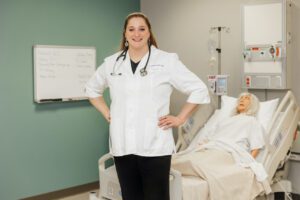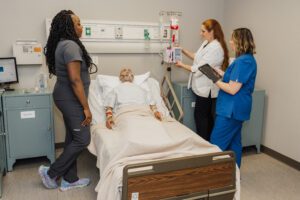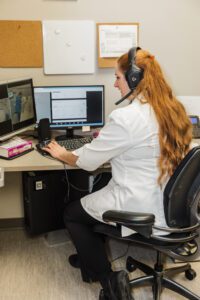Celebrating Healthcare Simulation Week with Bolivar Technical College’s Simulation Coordinator
Posted on September 20, 2023
 In honor of Healthcare Simulation Week, we’re delighted to bring you an exclusive interview with our college’s Simulation & Skills Center Coordinator, Lucinda Schmidt. With a wealth of experience and expertise in the field, Ms. Schmidt has been instrumental in shaping our cutting-edge simulation program. Let’s dive into the world of simulation through Ms. Schmidt’s eyes!
In honor of Healthcare Simulation Week, we’re delighted to bring you an exclusive interview with our college’s Simulation & Skills Center Coordinator, Lucinda Schmidt. With a wealth of experience and expertise in the field, Ms. Schmidt has been instrumental in shaping our cutting-edge simulation program. Let’s dive into the world of simulation through Ms. Schmidt’s eyes!
What drew you to being the Simulation & Skills Center Coordinator?
I’ve been a part of the sim department for quite a while and have loved it for a long time. When I was offered the position, I was still teaching regular nursing classes and that had been my joy for many, many years. So, for me it was at first a struggle of which do I give up? I love them both! Luckily, our Director, Erin Mock, reminded me I was still going to be teaching in simulation, and that the simulation isn’t just the scenario you go through, it’s the whole learning experience. I couldn’t resist and jumped right in. Being fully in the simulation side of the students’ programs, I get the chance to see them put their learning into action right in front of my eyes, and that is something that you can’t pass up.
What’s your favorite part of the student experience in simulation?
Oh, that one is easy. Watching them grow. I meet them when they first start out, at their first Fundamentals skills day, and watch them lesson by lesson, semester by semester grow into nurses. It is so exciting to see them jump in ability and become confident, competent, and capable individuals that are going to graduate and help make our community a better place.
How do you use your experience to create or choose simulation scenarios for BTC students?
The secret behind this is that it isn’t just me! Over the years, we have created a wide variety of simulations for our students. We use the experiences, insights, knowledge and skills from all of our faculty to ensure that our simulations are as real as possible, and what students encounter and do in simulation is accurate and reflects what they would do in the hospital/clinic/etc. to care for a patient with that condition. As simulation instructors, we take the input and needs from our faculty and their courses, and then follow the steps to create scenarios to meet those requirements. We don’t just pick a simulation because it is fun, we also make sure that it is meeting the needs of the students and the objectives of their classes. The process in creating simulations is almost as fun as watching the students go through them!
If you could pick one thing in the Sim lab that you think is so cool, what would it be?
This isn’t a fair question! There are lots of cool things in the sim lab. But, to be fair, the ALEXes are pretty cool. They are our AI simulation manikins that we use with almost every one of our simulations with the students. They are as lifelike as you can get without using a real person to play the role of the patient. The ALEXes have a pulse you can feel, you can watch their chest rise and fall as they “breathe”, and using their special stethoscopes, you can listen to their heart, lungs, stomach, and their blood pressure. They communicate with students using AI technology and can answer several questions as part of their programming [watch a video about ALEX here]. As instructors, we can also input responses for them, and control their vital signs like heart rate, respirations, and the sounds students hear with the stethoscope.
What’s the most challenging thing in simulation, for students and/or faculty?
For students, time and again, the biggest thing that they have told me is that it can be hard to “suspend disbelief”. Not everyone has this experience, and for those that have, it doesn’t necessarily happen with every simulation. But what it means is that it can be hard to cross that barrier into simulation and act as if the experience is real life the entire time. Part of what helps make this easier is that the equipment and supplies we use in our Simulation Lab are almost all things that you use and see in the hospital with real patients. The conditions and symptoms and how we care for a patient in simulation is the same as what we would do with a real patient in a real hospital setting. As invested faculty, we take a lot of steps to help minimize this, and overall, students do very well in their simulations.
For Faculty, the most challenging thing for us is when a student doesn’t do as well as we had anticipated them doing. Mistakes happen and it’s better that it happens in the lab where they can safely learn from those mistakes. It sounds silly to those outside of teaching or the simulation experience, but we do take it personally when a student doesn’t do well. When this happens, we want to know a root cause, so we talk with our students to find out where the misunderstanding or lack of knowledge is, and then take steps to address and fix that gap so it doesn’t happen again for that student, or any other student. As nursing educators, we are teaching our students how to be nurses and take care of people. My end goal is their success as a nurse, so we start by making them successful here.
As we wrap up this insightful interview with our Simulation & Skills Center Coordinator, we are reminded of the invaluable role that healthcare simulation plays in shaping the future of nursing education. Our faculties’ passion, dedication, and expertise in this field have shed light on the transformative power of hands-on learning and its impact on our students’ preparedness to excel in the dynamic healthcare landscape. We hope this interview has not only celebrated Healthcare Simulation Week, but also inspired you to recognize the immense value of simulation in nursing education!
